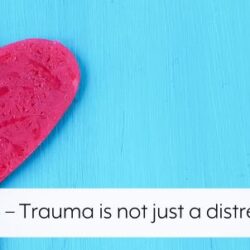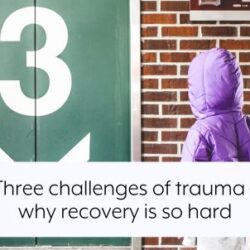
‘If I could just get over it, I would,’ I say, and I’m trying not to sound irritated or hurt but I’m not quite sure what emotion my face is displaying and my throat is tight and my fists are clenched and really I’d rather not be here, and neither am I convinced that I’m a good enough actor to hide all of this.
Jennifer has been lecturing me for a good five minutes on how I really don’t need to be affected by what happened to me when I was a child and that if I continue to react with flashbacks, nightmares and chronic pain, it’s my choice to do so and I really can’t expect any sympathy.
She’s doing it with a smile on her face and her voice is light and tinkly like a goldfinch, but I’m more than a little taken aback. Because, as I’ve just explained to her, if I could get over it, I would.
There’s a strange kind of logic in the mind of people like Jennifer. On the whole, they are well-meaning. They want to see us ‘well’. They are bothered by our symptoms, and at least they acknowledge them, which is more than most people do. The problem is that they don’t understand the back brain, domain of trauma, with its automatic, survival-based reactions, and so they assume, simplistically, that we can solve it all with our decision-making front brain.
‘It’s like dieting,’ she had said in another conversation. ‘If you really want to lose weight, you will. You just have to make that decision.’
I wanted to argue that studies show that it’s not a simple formula of calories in versus calories out, but Jennifer is having none of it. In her mind, if I want to lose weight, I just need to want to, and do it. If I want to be rid of trauma, I just need to want to, and do it. And I need to stop making excuses.
In Jennifer’s mind, the fact that I’ve tried, many times, for many years, just shows that I haven’t tried hard enough. The only conclusion I can, therefore, come to is that I am lazy and defective. (No wonder she’s irritated with me). And being (apparently) lazy and defective, my shame increases and so do my symptoms. It’s a vicious circle.
Following Jennifer’s numerous ‘pep talks’, I would lie in bed on a morning and decide that today was the day when I would ‘get over it’. Come on, I would say to myself, firmly, albeit lacking conviction. Let’s just stop it. Let’s get up and get on. I don’t need to feel like this. I’m just making it up anyway. I need to stop attention-seeking and just get over myself. I’ve had enough of being like this. I just want to get back to normal. So today I will.
Sometimes I would be able to pretend to myself that my heart wasn’t really racing at 120 beats per minute and that the diarrhoea was just a reaction to what I’d eaten last night. I’d force myself into productivity and get on for a good couple of hours, because I was ‘putting the past behind me’ and ‘moving on with my life.’ No point dwelling on the past, I would say to myself as another flashback swept in from the side.
Naturally, I couldn’t sustain this unreality for very long. The pain, the vomiting, the loss of consciousness, the switching … It was real, and my denial of it was making things worse, not better.
‘You just have to be firm with yourself,’ Jennifer explained when I described my symptoms. What she didn’t explain was what ‘being firm’ meant, or how it could possibly help. I’d been ‘firm’ with myself all my life. What actually was going to help was some self-compassion, not more self-abuse. But she didn’t know that because, like most people, she didn’t know the first thing about trauma.
She thought that trauma is about being upset about something. Stop being upset about it (be firm with yourself) and move on. It’s not entirely bad advice for minor life mishaps, like catching a bollard with the car door or someone forgetting your birthday. It’s woefully inadequate for trauma. Because it doesn’t take into account that ‘being upset’ is low on the list of impacts that trauma has. In fact, due to the very nature of trauma, we may feel no upset at all. We may not even remember the trauma in the first place, as amnesia protects us from its mutilated awfulness. How then do you ‘get over it’, if you can’t even remember it? How do you stop being upset about something when you don’t feel anything at all?
Trauma fundamentally changes the way our brains and bodies work. It is an adaptation to what our minds perceive – outside of conscious thought, awareness or choice – to be an imminent threat to our life or physical integrity. Trauma is a cascade of animalistic responses wired deep into our neurobiology with millions of years of evolutionary survival imperative at its core. We can no more stop ourselves reacting to trauma than we can stop our hair growing.
Trauma manifests in our bodies and the primitive parts of our brain. Our ‘front brain’ – the thinking, intelligent, reflective, creative, choosing human brain that we tend to think of as our whole brain – is sidelined. Trauma resides instead primarily in our back brain – the ancient, survival-based, instinctive, automatic brain that operates largely outside of conscious awareness.
This is why we can’t just ‘get over’ trauma. We can’t just make a decision: the front-brain makes decisions. But trauma isn’t in the front brain. It’s like deciding to slow our digestion, or stop our heart beating, or release more insulin: we can’t, consciously, do it.
It’s the uncontrollability of the impacts of trauma that makes it so scary. It makes us feel helpless before it. If it’s out of our control, implanted deep in our unreachable back brain, outside of conscious awareness, outside of choice, does this then mean that we cannot recover from trauma?
Not at all.
But we don’t recover from trauma by just deciding to ‘get over it’. We have to rewire our brain and nervous system: this is the work of psychotherapy. Not to talk endlessly and woefully about what happened, again and again and again, feeling sorry for ourselves and casting ourselves as the helpless and immutable victim – which is what most people seem to imagine we are doing when are going for some kind of mental health ‘treatment’. But a slow, steady process of retraining our body and brain to come out of the amber or red zones, of autonomic hyper- or hypo-arousal, back to the felt sense of safety of green. It’s about bringing parts of our front brain back online after the dropped connections of trauma. It’s about reframing, and mentalising, and developing ‘earned secure attachment’. It’s about working at the edges of our window of tolerance to bring unprocessed traumatic memory back into awareness so that the hippocampus, our brain’s ‘librarian’, can tag it as over. It’s about developing accurate ‘neuroception’, the ability to feel safe again in our bodies, after the unremitting ‘battle-stations’ response of our neurobiology.
Treatment for trauma is lots of things, but it’s not something you do on a Monday morning because you choose to. It’s a meticulous process of deeply-wired brain change, not a decision.
We can’t just decide not to be traumatised, just as we can’t decide for our heart rate to slow. What we can do, however, is create the right conditions for it to happen – sitting down, not walking up a mountain; in therapy, rather than in denial; committing to processing our past, not trying to ignore it.
A few years on from my early encounter with Jennifer – right when I was in the thick of therapy, when things were really starting to change but at the same time it felt that I was buried alive under the pain and the mess of it all – I bumped into her at the supermarket.
She smiled kindly but superciliously.
‘How are you doing?’ she said, leaning in towards me, close enough for me to smell her perfume. ‘Are you feeling better nowadays – you know, getting over things?’
I never know what to say to that kind of question. The honest answer, that week, would have been, ‘No, I’m feeling much, much worse. But it’s a good thing, because I’m feeling. I’m not pushing it all away all the time. I’m not dissociating from it. I’m not separating out my feelings from conscious awareness. I’m not numbing them with prescription painkillers and too much wine. I’m not pretending that bad stuff didn’t happen. Instead I’m learning how to deal with it. I’m working it through. I’m reframing what happened to me and realising that it wasn’t my fault. I’m putting the blame back where it belongs, rather than believing the lie that I was abused because I was bad. I’m learning about trauma and what it does to your brain and how that’s not my fault either. I’m learning how to handle triggers and I’m getting to know the various dissociated parts of myself. It’s a hell of a ride, and right now things feel pretty dire. So, no, I’m not feeling better at all. But thanks for asking.’
But of course I didn’t.
Instead I just smiled and said, ‘Yes, thank you.’
‘Aw that’s good to hear,’ she said, with her eyes almost tight shut in a patronising smirk. I curled my toes into the ground in an effort to subdue the urge to punch her.
We chatted for a few minutes about everything I wasn’t interested in, until normal life overwhelmed me with its tedium, and we started to make our moves.
‘It’s so lovely to see you,’ Jennifer said, in a way that made me feel like a shabby painting. ‘I’m so glad to see you’re putting the past behind you and moving on with your life.’
The words were out before I knew it, but at least I had enough control to mask them with levity: ‘Oh, it’s not so much about putting the past behind you,’ I said, ‘as embracing the fact that you survived your past. It’s about accepting that the past is real, rather than denying that it happened. It’s about recognising that we’ve been affected by the past, and not being ashamed of that.’
She stared at me with her mouth slightly open and her eyeballs rammed to the edges of their sockets.
I’ve just broken the rules, I thought to myself as a slight fizzle of panic chased up my spine. I’m not supposed to talk back.
Old habits die hard.
‘Okay, well, take care, and hope to see you again soon,’ Jennifer said, and walked off quickly.
Here’s the problem, I thought to myself. I had the trauma to deal with, and then I had people’s expectations of how to deal with the trauma to deal with. And it occurred to me, as it often did, that it was mainly the non-traumatised who had these expectations. People who had been traumatised were usually too busy trying to find the answers for themselves.
My hands were quivering and I suddenly felt a great pit of hunger in my stomach. It’s okay, I said to myself, as I had been learning to. It’s okay. You just stood up for yourself.
My mouth turned upwards into a smile and a little ray of hope warmed me on the inside. You can’t just ‘get over’ trauma because you decide to, I thought to myself. But you can recover from it. There’s a difference.
And I walked on to find some mayonnaise.



30 Comments
Oh wow. I wish I could show this to the friends and family and my GP who say that “put the past behind you” tome so so so much. They always seem so frustrated when they ask how I am and my answer isn’t what they hope to hear. It’s been too many years. It’s taking too long. And I’m now stuck in a hole truly believing that I am faking the DID and that nothing that bad every happened to me.
I think you’re amazing and your blog is incredible.
This story reminds me of why I rarely openly discuss my family background or my ongoing struggle with depression, even with very close friends. Folks that are lucky enough to have never experience depression, or trauma, or chronic fatigue syndrome, are simply unable to understand how crippling they can be. If you tell a friend (or even a family member) that you have been or currently are depressed, it can scare the crap out them. Often they try to help by pointing out some flaw in my personality (You are a little intense sometimes) or offering me an alternative worldview (there’s a silver lining in every experience …).
Depression is not a personality trait, or a failure of character. It’s an illness, not an existential problem. A disability. Kind of like carrying a bag of rocks on your back a lot of the time. If anything, we deserve Extra Credit for achieving anything with this stubborn, life-sucking disease. If your family were just dysfunctional to a normal degree (people spout athe pithy wisdom of “All Families Have Problems”), you can’t imagine surviving a multiple shooting, abandonment by a mentally ill parent, or being caught between 2 estranged, mentally ill, and hostile parents.
I guess we’ve just got to cut them some slack.0
I appreciate your wonderful writing and videos. Thanks so much!
Nailed it. Thank you for expressing what I am not yet able to.
This is exactly how I feel. I am 53 and I couldn’t say what you wrote but you did. I am SO GRATFUL TO YOU. It feels so different knowing someone is out there that knows who I am and we have never even met.
Thank You Thank You Thank You
It is so important that the truth about trauma is shared.
I have experienced this my whole life, that gradually made things worse with the layers of shame and no way to share and be heard.
It wasn’t until I found myself in recovery with others, hearing them share & being able to relate, that my body started to share with me also and I was able to learn a language to not only express what had happened, but to feel not alone in the emotional pain that follows.
It takes a life time to learn a new way of life, and I couldn’t walk that alone.
Thank you for having a voice and changing the way for others.
Thank you – helpful, and much appreciated
Im so lucky to have a therapist who specialises in trauma , never has he made me feel like or told me to get over it, he understands me completely and I am making progress in healing, but its not been easy. However, ive been supported by someone who gets it !
I really appreciate reading this article. I do think, though, that it’s the ones who are in denial about their own trauma who encourage us to ‘get over it’. My mum used to say that to me and she never did the work for her own recovery…
Agree
I DO HOPE YOU ARE ABLE TO READ THIS COMMENT, CAROLYN.
Just like EVERYTHING you write Carolyn, this article is AMAZING. And the timing is perfect. I have just left my position of 15 years, in a consumer lead organization (all staff and board are MH consumers and/or family members) dedicated to providing support to both inpatient and community individuals. I have loved working there. My boss’s intentions have been very supportive, but he is not someone with a trauma background, and as such, really has no idea. Over the last number of years, his intent has been to ‘help me’ so that I can ‘change the way I think’ and thus change my behaviours particularly at work. In your words “Here’s the problem. I had the trauma to deal with, and then I had people’s expectations of how to deal with the trauma to deal with.” The result was that constant push to ‘change’ made all my symptoms worse and increased all the negative thoughts about myself, resulting in my becoming too sick to work. I plan on sending this to him with a small, KIND note letting him know. The good news is that it pushed me into therapy and after 50 yrs I have finally been diagnosed with DID and I have found a therapist who I trust working with me. HaHa, I could think of a LARGE List of people who should read this. THANKS again for ALL THAT YOU DO!!!!
I do indeed read every comment! Thank you! CS xx
Jennifer is unaware that she has a very serious form of the new diagnosis (yet to be included in DSM VI) of
Fixed Identity Disorder 😉
Yep. All that! Thank you for expressing what i cannot. So many people i come across think exactly like your shiny yucky smile woman. Its so good to read …no im not feeling better, i feel like utter shit …but i am way ‘better’ because i know now this was DONE TO ME ‘ and whatever i have to go through its not my fault. Because I, too, now know for sure trauma soaked through my body and being and everything that has been unhappy for me has been defending agsinst it in all the split off wsys we do. I feel pretty rubbish just now but its ok. I know whats going on in me and why and how to make myself feel better. And for the last seven years i have had the therapist i need. I count myself lucky. Now i still need to stop trying to tackle that mountain all st once 🙂 Thank you Carolyn.
Just wanted to say a big thank you for the wonderful PODS website!
Such a wealth of information and experiences.
I am a voluntary counsellor, with little if no experience of working with clients struggling with a dissociate disorder.
I am beginning to get a firm understanding and feeling more empowered to work with clients .
Thank you !
On the daily assault of my suffering part of having to look after myself is proudly standing up to the actual concrete truth of my trauma suffering – being traumatised by people who don’t ‘get it’ and what my life has endured can be proper misery so developing a protective bond with myself and in a very healthy way talking to these people to tell them the actual horrific and very poignant truth. It’s not about who I am mentally (more how strong I am mentally) and the physically abused exterior isn’t about who I am but what has instead been done to David. Within the daily assault of the suffering is a quiet steely resilience and great fortitude and endurance that this trauma and torture won’t define who I am – a lot of years in therapy will give back to David and I know that the only beautiful wonderful part of what happened to me was in fact my will to survive it all and then re-define my life. When people now say “hope you feel a bit better” and even mentally torture me with their ignorance I put in a self-protective and self-compassionate stance of educating them for what living with trauma mentally and physically actually is.
Thank you for this article. It touches on so many points that most people don’t share or talk about and what it’s like to live as a trauma survivor. So many people really don’t understand and it’s in that non understanding that survivors can be potentially victimized again and again by being told they SHOULD let it go and get over it which just adds more shame to the original shame of not being able to do anything about being abused in the first place! Like in the article…. if I could, I absolutely would’ve already!
I had this very discussion with my father this week, he said “you’ve just got to put it in the bin and move on”. He does not support my recovery, begin to understand or take any responsibility. Thank you, I’ll show him this.
You know it would have been totally fine if you’d punched Jennifer 🙂 Great blog. Thank you
I’m at the stage when I’m able to say to that part of me that I wished didn’t exist, ‘You’re doing well’, after so many years of beating myself up. Instead I’m now able to encourage myself as I put into practice what I have been unable to do in the past. Thanks to my current counsellor. Thank you so much Carolyn for the work you do.
It’s so validating to see my feelings in writing!! I now have been given some hope that recovery is an option and I don’t have to live like this forever. Thank you so much for your vulnerability.
great article! very helpful!
Thank you!
beautifully said
Thank you.
Thank you so much for this. I needed to be reminded to show myself compassion as I continue to work through my own childhood trauma.
I came across this article today.. I really needed it! I’ve been suppressing so much from my childhood/teenage years now I’m nearly 25 everything is spilling over and the way people have been with me has made me feel like I’m going mad. Telling me to just get over it and to not let it get to me.. if only! I’m now seeing a wonderful therapist and I thank god for her. She always lets me know how important it is to hold space and be gentle with myself. I feel so relieved after reading this. Thanks so much. I know I’m not alone but it sure can feel like that when the people around you make you feel ashamed for expressing after to many years of suppressing.
Thank You for writing this blog. I so appreciate your honesty and the education you are providing. Thank You for sharing your struggles and strength. I am gaining a new understanding of those around me and I thank you for this. Because of your words I
also understand myself better.
Thank you. This is spot on. I don’t want to feel this shit. To react like I do. But even though I understand why I can’t think clearly when he’s around, doesn’t mean I can think clearly when he’s around.
This was a phenom read. And it’s not only people who haven’t been through significant trauma that act like this. It’s also people who have and have shoved it out of their minds and don’t handle well seeing other people who are working through things because it likely makes them uncomfortable somewhere beneath the exterior. We also sometimes do it to ourselves after being in it for a long time.